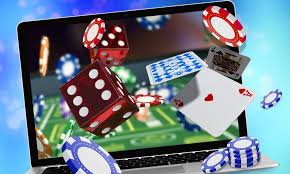
Play to Win: The Ultimate Guide to Winning Strategies
The gaming and sports landscape has evolved to become more than just a pastime; it has turned into a competitive arena where the mantra is clear: Play to Win, Win to Play mostbet-sports.com/fr, Win to Learn. In this comprehensive guide, we will delve into what it truly means to adopt a ‘play to win’ mindset and how it can be leveraged for success across various disciplines. Whether you’re a seasoned athlete, a budding gamer, or someone venturing into new habits, embracing the right strategies can change the way you approach competition and achievement. This exploration not only includes winning techniques but also highlights the psychological underpinnings of success.
The Philosophy Behind ‘Play to Win’
At its core, ‘Play to Win’ is a philosophy grounded in intention and focus. It emphasizes not just participation, but the active pursuit of victory in any competitive context. This approach is prominent across diverse fields, from sports to business and gaming. The fundamental principle is simple: to be truly competitive, one must adopt a mindset that prioritizes winning while allowing for enjoyment and growth.
1. Understanding Your Goals
The first step in adopting a ‘Play to Win’ philosophy is understanding your goals. It involves asking yourself what you want to achieve and why it matters to you. Are your aspirations to improve your skills, achieve recognition, or even win prizes or accolades? Defining your end goal clarifies your path forward and helps you set actionable steps toward that achievement.
2. Adopting a Growth Mindset
Integral to the ‘Play to Win’ philosophy is the concept of a growth mindset. Developed by psychologist Carol Dweck, this mindset revolves around the belief that abilities and intelligence can be developed through dedication and hard work. By fostering resilience, embracing challenges, and learning from criticism, individuals can enhance their potential and increase their likelihood of winning.

3. Training with Purpose
Whether in sports, gaming, or any competitive realm, focused training is essential. Establishing a regimen that hones your specific skills will prepare you for competition. This can include physical training for athletes, strategic practice for gamers, or skill-building sessions for professionals. Efficiency in training translates directly to improved performance.
4. Analyzing Your Competition
Part of playing to win involves understanding your competitors. Conducting thorough analyses allows you to identify their strengths and weaknesses, which you can exploit to your advantage. This competitive intelligence can be the difference between victory and defeat, as it prepares you to adjust your tactics to outmaneuver your opponents.
5. Developing Mental Fortitude
An often-overlooked aspect of the ‘Play to Win’ strategy is mental toughness. Being able to maintain focus, resilience, and positivity even in dire circumstances is crucial. Techniques such as visualization, meditation, and mindfulness can be invaluable in building this mental fortitude. When faced with adversity, the winner’s mindset is to see obstacles as opportunities for growth.
Win to Learn: The Cycle of Improvement
The journey of winning does not end with victory; rather, it serves as a learning experience. Adopting a ‘Win to Learn’ approach allows you to reflect on your experiences and continually evolve. Winners must analyze not only what led to their success but also what obstacles they faced and how they overcame them. This introspection develops greater awareness and fosters a culture of continuous improvement.
1. Reflecting on Performance

After each competition or game, take the time to assess your performance critically. Were your tactics effective? Did you remain committed to your goals? Were there moments where you could have executed differently? This reflection will highlight areas for growth—turning achievements and failures alike into valuable lessons.
2. Seeking Feedback
Engaging with coaches, peers, and mentors can provide external perspectives on your performance. Constructive feedback is essential for growth, as it uncovers blind spots and offers insight into areas you might overlook. Learning from others can provide diverse strategies and techniques to incorporate into your own game plan.
3. Setting New Goals
After reflecting and receiving feedback, it’s essential to set new, achievable goals. This process involves reassessing your objectives and ensuring they align with your long-term vision. Goals should be dynamic—consistent adaptation to your evolving skills and insights will help keep your ambitions in line with your capabilities.
The Social Aspect of Competition
While competition is often viewed as an individual pursuit, the social aspect plays a significant role. Interactions with fellow competitors can foster camaraderie and create a community mindset. Engaging with others allows for shared knowledge and experiences—transforming competitions into avenues for connection and learning. These relationships can offer support and motivation, which are invaluable for individuals striving to succeed.
Final Thoughts
To embody the ‘Play to Win’ and ‘Win to Learn’ philosophies is to embrace a holistic approach to competition. Engaging fully with the pursuit of victory while recognizing that each experience carries lessons for growth is what sets the successful apart from the rest. Ultimately, it’s not just about the accolades you achieve but the person you become in the process. By following these principles, you not only enhance your potential for success but also foster an enriching journey within any competitive landscape.
